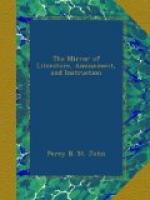Why is a short gallop called a canter?
Because of its abbreviation from Canterbury, the name of the pace used by the monks in going to that city.
Why was a certain noise called the “hunt’s-up?”
Because it was made to rouse a person in a morning; originally a tune played to wake the sportsmen, and call them together, the purport of which was, The hunt is up! which was the subject of hunting ballads also.
This expression is common among the older poets. One Gray, it is said, grew into good estimation with Henry VIII. and the Duke of Somerset, “for making certaine merry ballades, whereof one chiefly was, the hunte is up! the hunte is up!” Shakspeare has—
Since arm from arm that voice doth
us affray,
Hunting thee hence with hunts-up to the day.
Romeo and Juliet.
Again, in Drayton’s Polyolbion—
No sooner doth the earth her flow’ry
bosom brave,
At such time as the year brings on the pleasant
spring,
But hunts-up to the morn the feather’d
sylvans sing.
Why is a small hunting horn called a bugle?
Because of its origin from bugill, which means a buffalo, or perhaps any horned cattle. In the Scottish dialect it was bogle, or bowgill. Buffe, bugle, and buffalo, are all given by Barrett, as synonimous for the wild ox.—Nares’ Glossary.
Why is the stirrup so called?
Because of its origin from stigh-rope, from stigan ascendere, to mount; and thus termed by our Saxon ancestors, from a rope being used for mounting when stirrups began to be used in this island. It is evident, from various monuments of antiquity, that, at first, horsemen rode without either saddles or stirrups.
Why are sportsmen said to hunt counter?
Because they hunt the wrong way, and trace the scent backwards. Thus, in an old-work, Gentleman’s Recreations: “When the hounds or beagles hunt it by the heel, we say they hunt counter.” To hunt by the heel must be to go towards the heel instead of the toe of the game—i.e. backwards.—Nares.
* * * * *
WEATHER AT PARIS.
It appears from observations made at the Royal Observatory in Paris, that, in the year 1830, the number of fine days was 164; of cloudy, 181; of rainy, 149; of foggy, 228; of frosty, 28; of snowy, 24; of sleety, 8; of thundery, 13. The wind was northerly 44 times; north-easterly, 23 times; easterly, 17 times; south-easterly, 23 times; southerly, 74 times; south-westerly, 69 times; westerly, 71 times; and north-westerly, 47 times.—New Monthly Magazine.
* * * * *
BEER HOUSES.
It appears, from Parliamentary Returns, that five thousand three hundred and seventy-nine “beer houses” have been opened under the new Act in England and Wales; while the number of public-houses licensed is forty-five thousand six hundred and twenty-four. The number of beer-houses opened in Wales, is one thousand seven hundred and seventy-three, nearly half the number opened in all England—the number for England is three thousand six hundred and six.—Ib.




